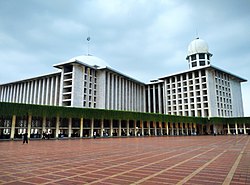Our website is made possible by displaying online advertisements to our visitors.
Please consider supporting us by disabling your ad blocker.
Islam in Indonesia
 Istiqlal Mosque, the national mosque and the largest mosque in Southeast Asia. | |
| Total population | |
|---|---|
87,06% of the population[1][a] | |
| Languages | |
| Islam by country |
|---|
 |
|
|
Islam is the largest religion in Indonesia, with 87.06% of the Indonesian population identifying themselves as Muslims, based on civil registry data in 2023.[3][b] In terms of denomination, the overwhelming majority are Sunni Muslims; the Pew Research Center estimates them as comprising ~99% of the country's Muslim population in 2011,[4] with the remaining 1% being Shia who are concentrated around Jakarta[5] and about 400,000 Ahmadi as well.[6]
In terms of schools of jurisprudence, based on demographic statistics, 99% of Indonesian Muslims mainly follow the Shafi'i school,[7][8] although when asked, 56% do not adhere to any specific school.[9] Trends of thought within Islam in Indonesia can be broadly categorized into two orientations: "modernism", which closely adheres to orthodox theology while embracing modern learning, and "traditionalism", which tends to follow the interpretations of local religious leaders and religious teachers at Islamic boarding schools (pesantren). There is also a historically important presence of a syncretic form of Islam known as kebatinan.
Islam in Indonesia is considered to have gradually spread through merchant activities by Arab Muslim traders, adoption by local rulers, and the influence of Sufism since the 13th century.[10][11][12] During the late colonial era, it was adopted as a rallying banner against colonialism.[13] A 2023 Pew Research Center report gave 93% of the adult Indonesian population identifying themselves as Muslim.[14] Today, although Indonesia has an overwhelming Muslim majority, it is not an Islamic state, but constitutionally a secular state whose government officially recognizes six formal religions.[c]
- ^ "Religion in Indonesia".
- ^ Al-Jallad, Ahmad (30 May 2011). "Polygenesis in the Arabic Dialects". Encyclopedia of Arabic Language and Linguistics. BRILL. doi:10.1163/1570-6699_eall_EALL_SIM_000030. ISBN 9789004177024.
- ^ "Religion in Indonesia".
- ^ "Sunni and Shia Muslims". Pew Research Center. 27 January 2011.
- ^ Reza, Imam. "Shia Muslims Around the World". Archived from the original on 22 May 2009. Retrieved 11 June 2009.
approximately 400,000 persons who subscribe to the Ahmadiyya
- ^ "International Religious Freedom Report 2008". US Department of State. Retrieved 31 March 2014.
- ^ "Sunni and Shia Muslims". 27 January 2011.
- ^ Religious clash in Indonesia kills up to six, Straits Times, 6 February 2011
- ^ "Chapter 1: Religious Affiliation". The World's Muslims: Unity and Diversity. Pew Research Center's Religion & Public Life Project. 9 August 2012. Retrieved 6 September 2015.
- ^ Cite error: The named reference
Hawas invoked but never defined (see the help page). - ^ Burhanudin, Jajat; Dijk, Kees van (31 January 2013). Islam in Indonesia: Contrasting Images and Interpretations. Amsterdam University Press. ISBN 9789089644237 – via Google Books.
- ^ Lamoureux, Florence (1 January 2003). Indonesia: A Global Studies Handbook. ABC-CLIO. ISBN 9781576079133 – via Internet Archive.
- ^ Cite error: The named reference
ReferenceAwas invoked but never defined (see the help page). - ^ "Most people in the countries surveyed identify as Buddhist or Muslim". Pew Research Center. 6 September 2023. Retrieved 17 September 2023.
- ^ Yang, Heriyanto (August 2005). "The History and Legal Position of Confucianism in Post Independence Indonesia" (PDF). Marburg Journal of Religion. 10 (1): 8. Retrieved 2 October 2006.
- ^ "Pemerintah Setuju Penghayat Kepercayaan Tertulis di Kolom Agama KTP". Detikcom. 8 May 2017. Retrieved 11 July 2017.
Cite error: There are <ref group=lower-alpha> tags or {{efn}} templates on this page, but the references will not show without a {{reflist|group=lower-alpha}} template or {{notelist}} template (see the help page).
Previous Page Next Page


